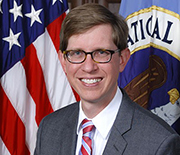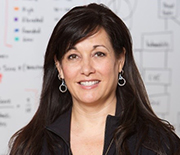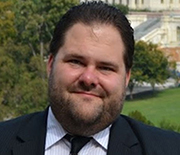News Release 18-003
CyberCorps: Scholarship for Service recognizes first hall of fame recipients
3 individuals recognized for contributions to defend US cyberspace

NSF's CyberCorps: Scholarships for Service program helps generate more cybersecurity professionals.
January 10, 2018
This material is available primarily for archival purposes. Telephone numbers or other contact information may be out of date; please see current contact information at media contacts.
The National Science Foundation's (NSF) CyberCorps: Scholarship for Service (SFS) program today announced its inaugural class of SFS Hall of Fame recipients, recognized for making outstanding contributions to cybersecurity.
The SFS Hall of Fame received nominations from more than 60 universities. The three members of the first class are Josiah Dykstra, Mischel Kwon and Steven Hernandez. NSF made the announcement during the annual CyberCorps: SFS Job Fair in the Washington, D.C. area.
"Selecting the members of the inaugural class was very difficult, since we received nominations for many outstanding SFS alumni," said Victor Piotrowski, CyberCorps: SFS lead program director in NSF's Education and Human Resources Directorate. "The quality of nominees shows how the SFS program contributes to improving the posture of cybersecurity in the government."
NSF established the SFS program in 2000 to provide scholarships to students studying cybersecurity and to increase the U.S. higher education enterprise's ability to produce cybersecurity professionals. To date, more than 3,300 students have received scholarships and committed to work for federal, state, local or tribal government organizations in positions related to cybersecurity.
The inaugural members are:
- Josiah Dykstra, author of "Essential Cybersecurity Science," a 2016 guide for using the scientific method to build, test and evaluate systems. In 2017, he received both the Presidential Early Career Award for Scientists and Engineers (PECASE) and the Hope College Young Alumni Award. In 2013, he received the Director of National Intelligence's Galileo Award and the U.S. Department of Defense's David O. Cooke Excellence in Public Administration Award. Ever motivated to share and apply his extensive knowledge, Dykstra mentors university students and junior National Security Agency (NSA) employees. Dykstra graduated from an SFS program at Iowa State University with a master's degree in information assurance in 2004. He also received a doctoral degree from the University of Maryland Baltimore County, another SFS school, in 2013. Dykstra is currently a cybersecurity expert employed by the NSA.
- Mischel Kwon graduated from a joint SFS program at Marymount University and George Washington University in 2005, receiving a master's degree in computer science with an emphasis in information assurance. While serving as the deputy director for information technology security staff at the U.S. Department of Justice, she built the first Justice Security Operations Center to monitor and defend the department against cyber threats. Kwon also served as the director of the Department of Homeland Security's U.S. Computer Emergency Readiness Team (US-CERT), spearheading the organization responsible for analyzing and reducing cyber threats and vulnerabilities in federal networks, disseminating cyber threat warning information and coordinating national incident response activities. After leaving government service, Kwon served as vice president of public sector security for RSA Security, leading the company in assisting the public-sector security solutions, strategies, technologies and policy. In 2016, she founded MKACyber, a managed security operations services provider and security consulting company. She currently serves as MKACyber's CEO.
- Steven Hernandez has held information assurance positions at the U.S. Department of Education, the U.S. Department of Agriculture and an NSA National Security Administration Center of Academic Excellence Research Institute in Idaho. In 2010, he joined the Department of Health of Human Services, where he has served as chief information security officer for the Office of Inspector General. In 2016, the Department of Education hired Hernandez as chief information security officer. In this role, he maintains the department's integrity and privacy, and coordinates and integrates all aspects of its cybersecurity, telecommunications and information security programs. Hernandez graduated from the SFS program at Idaho State University with a Master of Business Administration in information assurance/computer information systems in 2007, and a bachelor's degree in computer information systems and an associate's degree in electronic systems from the same institution.
-NSF-
-
Josiah Dykstra.
Credit and Larger Version -
Mischel Kwon.
Credit and Larger Version -
Steven Hernandez.
Credit and Larger Version
Media Contacts
Bobbie Mixon, NSF, (703) 292-8070, email: bmixon@nsf.gov
The U.S. National Science Foundation propels the nation forward by advancing fundamental research in all fields of science and engineering. NSF supports research and people by providing facilities, instruments and funding to support their ingenuity and sustain the U.S. as a global leader in research and innovation. With a fiscal year 2023 budget of $9.5 billion, NSF funds reach all 50 states through grants to nearly 2,000 colleges, universities and institutions. Each year, NSF receives more than 40,000 competitive proposals and makes about 11,000 new awards. Those awards include support for cooperative research with industry, Arctic and Antarctic research and operations, and U.S. participation in international scientific efforts.
Connect with us online
NSF website: nsf.gov
NSF News: nsf.gov/news
For News Media: nsf.gov/news/newsroom
Statistics: nsf.gov/statistics/
Awards database: nsf.gov/awardsearch/
Follow us on social
Twitter: twitter.com/NSF
Facebook: facebook.com/US.NSF
Instagram: instagram.com/nsfgov





